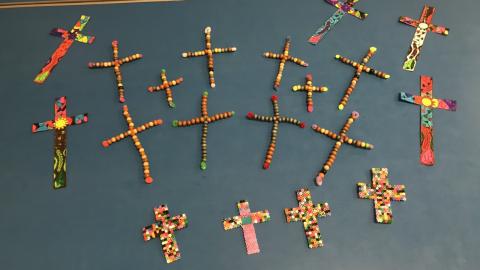We follow the North Yorkshire Agreed Syllabus for Religious Education which focuses on teachings from and teaching about a range of religions and world views.
“RE explores big questions about life, in order to find out what people believe and what difference this makes to how they live, so that pupils can make sense of religion and worldviews, reflecting on their own ideas and ways of living.” NYCC Agreed Syllabus 2019-2024
RE is taught either as part of a class topic or weekly as a discrete subject focused on a Big Question. Where RE is taught within a topic, teaching may be blocked (i.e. during an enriched 'Sanctuary Week' where learning is focused on the Easter story) or ‘Arts and Other Faiths’ week which promotes diversity.
Pupils learn about Christianity in each Key Stage alongside the other principle religions and non-religious world views represented in the UK today. Our learning is based around 3 strands:
- Believing,
- Expressing,
- Living,
and the connections between them; encouraging learners to think about the religions and world-views of others respectfully.
Our EYFS children encounter Christianity and other faiths as part of their growing sense of self, their community and their place within it. Their learning is linked to flexible focus areas such as special people, objects, times, places and books; which allows them to explore and develop their understanding of the world through experiences and stories.
In Key Stage 1 children focus on Christians, Muslims and Jewish people. They begin to learn more about the beliefs, traditions and celebrations associated with different faiths. Stories are again central to their learning and act as the launch point for many activities linked to the different faiths.
In Key Stage 2 this focus extends to include Hinduism and Humanism alongside thematic studies e.g. ‘Why do people pray?’, which compare the traditions and beliefs of different faiths. At this point in their learning, the children begin to make more links between beliefs and the traditions of different faiths which they see in the world around them. They learn to value opportunities for discussion, to present their point of view, be listened to carefully and to offer the same experiences to others.
The children are always encouraged to share their personal experiences of faith and belief. This serves as a valuable starting point for class discussions and further fosters the development of our core values such as respect, kindness, friendship and tolerance.
Throughout the year, children have the opportunity to prepare and participate in services linked to Christian festivals at our local churches.
- Harvest Festival is a time to give thanks but also gives us the opportunity to support the more vulnerable members of our communities through the donations of food which are collected.
- Christmas celebrations are led by our youngest children, who retell the story of the Nativity and bring great joy to all!
- Our Easter Service allows children to reflect on the importance of the events of Holy Week and to develop their understanding of how the arts – music, drama, poetry and prose – are so important in expressions of belief.
Our learning linked to these important times in the Christian Calendar have been enhanced through the Leeds Diocese ‘Rhythm of Life’ resources for Advent and Lent.
Our Ethos Statements, Collective Worship sessions and SMSC questions further explore stories and values which are central to the Christian faith and to other world views. They encourage children to think about complex ideas and to express their thoughts and opinions in a safe place. Children refer to, build on and respond to each other’s ideas and enjoy having the opportunity to consider these throughout their day. They think carefully and learn to share their ideas and opinions in a thoughtful and respectful way.

